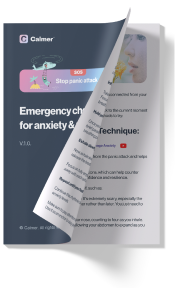Anxiety is a common issue that can greatly affect your thoughts, behaviors, and well-being. Finding natural remedies for anxiety is key, and different methods work for different people. In this article, we’ll explore how positive affirmations can help with anxiety and promote inner peace.
Anxiety goes beyond typical stress or worry. It’s a persistent feeling of fear and unease that can disrupt daily life. Research shows anxiety stems from a mix of biological, psychological, and environmental factors, making it a complex condition to manage. Positive affirmations offer a simple, natural way to ease anxiety and support mental health.
What Are Affirmations?
Affirmations are positive statements that can help you to challenge and overcome self-sabotaging and negative thoughts. When you repeat them often and believe in them, you can start to see positive changes. Affirmations may be especially beneficial in helping to reduce anxiety, as they encourage a shift in mindset towards positivity and self-empowerment.
How Affirmations Can Help with Anxiety
- Focus – Affirmations help shift your focus from negative, anxiety-inducing thoughts to more positive, empowering beliefs about yourself and your circumstances.
- Self-awareness – Regular practice of affirmations encourages you to reflect on your thoughts and feelings, increasing your self-awareness and understanding of your anxiety triggers.
- Positive Thinking – By reinforcing positive thoughts, affirmations can help break the cycle of negativity and fear that often accompanies anxiety.
- Self-confidence – Affirmations can boost self-confidence and self-esteem, making you feel more capable of handling stressful situations without succumbing to anxiety.
List of 10 Positive Affirmations for Anxiety
To provide you with a starting point, let’s explore ten positive anxiety affirmations. They are well suited to help with general anxiety and anxiety attacks. After these I’ll show you how to create your own unique affirmations that are best suited for your specific situation.
Affirmation 1: Embracing Calm
I find peace and calm in every moment. I release anxiety and welcome serenity.
Affirmation 2: Recognizing Strength
I am strong and resilient. I have overcome challenges before, and I have the inner strength to face anxiety.
Affirmation 3: Practicing Self-Love
I love and accept myself fully. I am worthy of love, happiness, and peace.
Affirmation 4: Cultivating Patience
I trust the timing of life. Everything unfolds as it should, and I am patient with my journey.
Affirmation 5: Embracing Growth
I welcome growth and change. I embrace new experiences that help me evolve.
Affirmation 6: Encouraging Healing
I release negativity and invite healing into my mind, body, and spirit.
Affirmation 7: Building Confidence
I trust in my abilities and have confidence in handling any challenge.
Affirmation 8: Choosing Positivity
I choose positivity and attract uplifting experiences and people into my life.
Affirmation 9: Accepting Change
I see change as an opportunity for growth and trust that new beginnings bring transformation.
Affirmation 10: Finding Inner Peace
I am grounded and centered. I carry inner peace with me wherever I go.

3 Tips For Creating Personal Anxiety Affirmations
Creating personalized affirmations that resonate with you is essential for their effectiveness. Here are some tips to help you craft powerful anxiety affirmations:
- Be specific – Tailor affirmations to address your specific anxiety triggers.
- Use positive language – Focus on what you want to feel or achieve rather than what you want to avoid.
- Make them believable – Choose affirmations that you can genuinely connect with and that feel attainable.
Address Your Unique Anxiety Triggers
To craft effective affirmations for anxiety, first identify your triggers. Reflect on situations or thoughts that increase your anxiety, then create affirmations that directly address them.
For example, if public speaking triggers your anxiety, try an affirmation like, “I am calm and confident when speaking to others.” Focus on positive outcomes rather than the anxiety itself.
You can also counter negative self-talk. If you often doubt your abilities, use affirmations like, “I am deserving of success and happiness.”
Make your affirmations personal and meaningful. Practice them regularly, and integrate mindfulness meditation to help observe anxious thoughts without getting caught up in them. This can foster greater calm and resilience over time. Everyone’s journey is unique, so explore what works best for you.
The Psychology of Positive Affirmations
Positive affirmations work by replacing negative thoughts with positive and empowering statements. When we consistently repeat these affirmations, we begin to internalize them and shift our mindset. The brain’s neuroplasticity allows it to rewire existing thought patterns and establish new, more helpful beliefs.
Research & Science Behind Affirmations
There is a wide range of research that has studied the effects of affirmations. Studies have looked at various aspects of mental health, including stress reduction, self-esteem, performance in stressful situations, and overall well-being. Here are some highlights of the research findings on affirmations:
- Stress Reduction and Performance Improvement: A notable study by Creswell et al., published in 2013 in the journal “Psychological Science,” found that a brief self-affirmation activity could reduce the brain’s response to stress and improve problem-solving performance under pressure. This study suggested that affirmations could help mitigate the negative effects of stress on performance and decision-making.
- Self-esteem and Well-Being: Research has shown that self-affirmations can positively affect self-esteem and general well-being. In a study by Harris et al. (2009) in the “Journal of Social and Clinical Psychology,” participants who practiced self-affirmations reported higher levels of self-esteem compared to a control group. This suggests affirmations can play a role in enhancing an individual’s view of themselves and their life satisfaction.
- Behavioral Changes: Studies have also explored how affirmations can influence behavior. For example, research in the field of health psychology has found that self-affirmation can make individuals more open to behavior change messages, such as those promoting healthy eating or smoking cessation. This effect was highlighted in The impact of self-affirmation on health-behavior change: a meta-analysis, published in “Health Psychology” in 2015, which demonstrated that self-affirmation could increase receptiveness to health-promoting messages and encourage healthier behaviors.
- Academic Achievement: Affirmations have been studied in educational settings as well. A study by Cohen et al. (2006) in “Science” showed that a series of self-affirmation exercises improved the academic performance of minority students, who are often subject to stereotype threat. This research suggests that affirmations can help reduce the performance gap caused by social pressures and stereotypes.
- Emotional Well-being: Further research indicates that self-affirmations can help reduce rumination and defensiveness, which are often linked with mental health issues like depression and anxiety. This is supported by studies that have found practicing self-affirmations can lead to decreases in negative emotions and increases in positive emotions.

